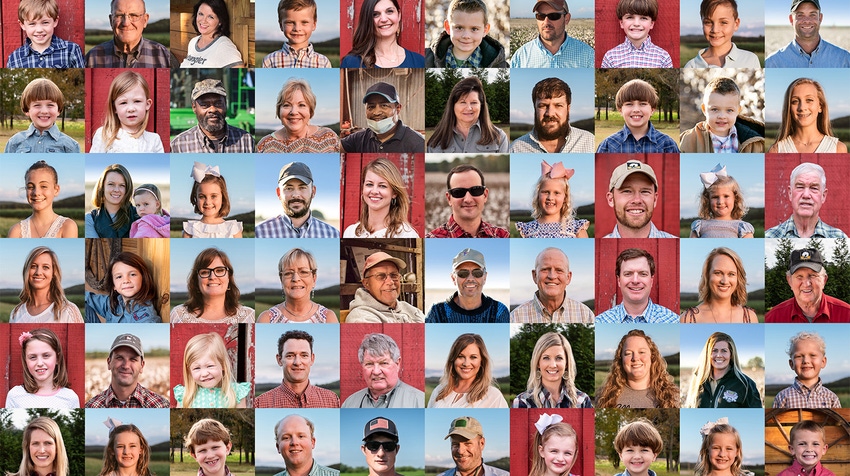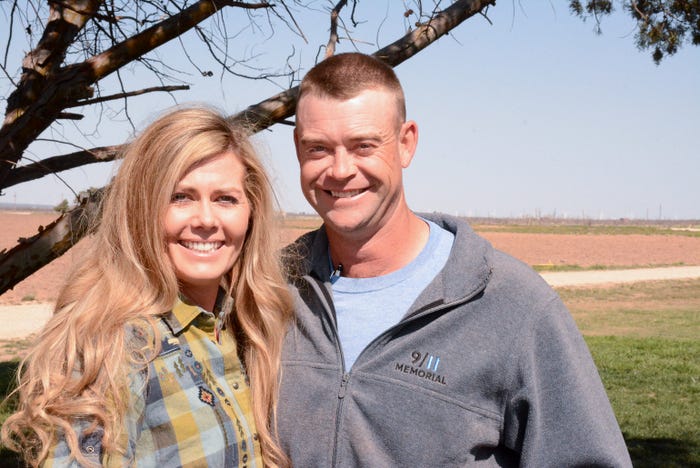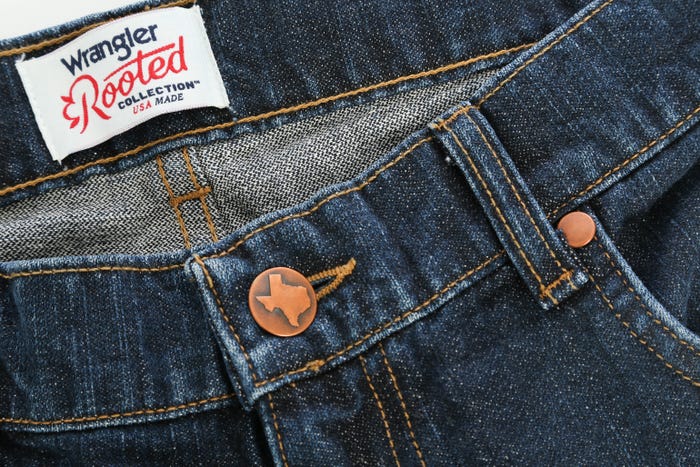
April 19, Wrangler released its Rooted Collection featuring state-specific jeans and t-shirts made of sustainable, traceable-to-the-farm cotton from family farms across the Cotton Belt, including Texas, Alabama, Georgia, North Carolina and Tennessee.
Each state’s jean design includes a unique wash, as well as trim and patch details featuring the state’s silhouette and the grower’s signature imprinted on the inside pocket. The Texas Jean, and all five of the state t-shirts, are made of cotton grown on Vance and Mandie Smith’s farm near Big Spring, Texas.
See photo gallery, Wrangler uses locally-sourced sustainable cotton in new collection
hile Mandie will you tell you she and Vance are normal people, minding their own business and working hard to produce America’s cotton, Wrangler sees much more.

“I first met Vance and Mandie at a Lubbock cotton conference and field tour hosted by BASF,” says Roian Atwood, Wrangler’s senior director of global sustainable business. “Vance gave a very compelling talk about what it was like for him to be a producer, to be a cotton farmer. He actually ended his talk with a powerful poem, written by a friend of his, that eloquently describes the different hats farmers wear throughout their daily routine, from being a business person to a welder to a planter to an agroecologist.”
While the poem pointed out how farming is more complex than those outside of farming realize, requiring a certain dedication to manage all of the different knowledge spheres, Atwood says it was Vance’s last, unscripted statement in a video Wrangler created with he and Mandie, talking about their sustainable practices, that caught his attention.
“Vance says, ‘It’s out of necessity. We have to do these things to survive and it’s our choice.’ It’s so powerful. We all have different motivations, whether it be better economic productivity, better environmental benefit, or what we’re supposed to do. But what I loved about Vance’s statement was that he owned it. He said, ‘I'm doing this because it's my choice, not because I'm motivated by these other external factors.’”
The five families participating in the program are the first growers in Wrangler’s Science and Conservation program. Each of the families use sustainable practices such as cover crops, crop rotation and conservation tillage, and share on-farm data but also take the time to teach Wrangler, says Atwood.
“We're not claiming as a denim brand to be agroecologists, but what we want is to have an understanding and ability to say, ‘This is what all the science is saying, tell us, is this right? Is this what you're seeing on your farm?’ The ability to have that conversation is so valuable.”
ALL AMERICAN
From their field in Texas to final production, the Rooted Collection is 100 percent, “Made in America” which proved to be a difficult task as much of the textile supply chain has been outsourced over the years to other countries.
See, Farm wife: growing cotton is personal, not just a commodity
"What happens is after 60, 70 years of off-shoring and that momentum, is a lot of the infrastructure -- the plants, the mills, that take raw cotton and convert it into yarn and into fabric and then into cut and sew -- is not available,” says Atwood.
The supply chain also used to operate in a closer proximity. Historically, it was possible to find a gin to cut and sew in a 250-mile radius in the Southeast, Atwood says. Today they are further apart.

“The t-shirt was harder to build than the jeans. It passed through five different hands,” he says.
First the cotton was produced and ginned in Big Spring on the Smith’s farm and then sent to Kings Mountain, N.C., to Patrick Yarns. Next it was shipped to Lumberton, N.C., where it was knitted by Contempora Fabrics and then sent to Gaffney, S.C., to Carolina Cotton Works where it was dyed. Lastly, the shirts were delivered to Andrews, S.C., where they were cut and sewn by Palmetto Apparel Services and finally sent back to North Carolina where they were printed by TS Designs in Burlington.
See, Drip irrigation increases farm efficiency
"That’s a lot of hands for a product to touch, a lot of opportunity for quality issues but at the same time, the beauty of it is it's a lot of geographies where people are employed at a lot of places that people call home and they're all connected to it.
“We have this wall of portraits (at Wrangler) of all the farming faces and the people in the factories and it shows the interconnected fabric of this project. It’s heartwarming to think about all of the people who have touched this from beginning to end,” says Atwood.
The Rooted Collection jeans are only for men but a women’s line is in the works. To learn more about the Rooted Collection or to purchase the state-jeans, go to www.wrangler.com/collections/wrangler-rooted.html
About the Author(s)
You May Also Like






